Notes
- ↑ Daniel Stone,A History of East Central Europe, University of Washington Press, 2001, p. 30, ISBN 0-295-98093-1 Google Books
Johannes Plavius (born c. 1600) was a German poet that most likely was born in Central German Thuringia, in Neuhausen (as he calls himself "M. Johannes Plavius Nehusâ Thüringus" in some works) or Plauen (Latinized to Plavia), from which his surname was derived.
At the end of 1624, he was part of a Dichterkreis (circle of poets ) in Danzig (Gdańsk) in Poland and called himself Magister (Master of Arts) for the first time in 1626. Danzig at the time had no university, so Plavius must have obtained his degree somewhere else, most likely Frankfurt/Oder since a Johannes Plavius Tyrigotanus ("Johannes Plavius Thuringian") is listed in the registers of the winter semester of 1621.
The pastor and poet Michael Albinus in Danzig (Gdańsk), who was born in nearby Pröbbenauin in the Polish–Lithuanian Commonwealth. [1] , later wrote that Plavius was active as a private teacher, providing basic instruction in the Latin language. He may have operated one of the small, semi-official Latin schools in Danzig; one assumes that he had received the necessary educational license, because he had written his Praecepta logicalia in 1628. He was certainly close to scholars and students in the city, and he served as an influence to Andreas Gryphius. Plavius maintained relationships with other poets, such as Martin Opitz, Johann George Moeresius, and Peter Crüger. Plavius mentions Crüger in the opening letter to his Institutio Poetica. Crüger dedicated an extremely laudatory poem to Plavius, which appears in the preface to the Praecepta logicalia.
Plavius dedicated several poems to Susanne Nuber, the daughter of a Danzig minister. Moeresius was her brother-in-law, and Plavius dedicates some of his poems to him. These contacts were successful as Plavius may have wed Nuber by 1630.
Plavius dedicated his Lehrsonnete to the councilmen of Danzig: Denen ehrenvesten und vorachtbarn herren schöpffen-herren in der rechten Stat Dantzig, Hn Arnold Dilbert, Hn. Johann Roggauen, Hn. Valentin Rögelern, Hn. Michael Bachmann.
Plavius also maintained a relationship with a wealthy brewer from Danzig named Abraham Hoewelcke (1576–1649). Plavius would later mention Hoewelcke's son in the dedication to his Praecepta logicalia as Johannes Hoeffelius – better known as Johannes Hevelius, the astronomer.
The place and year of Plavius' death are unknown. The year of his death must have occurred after 1630.

Johannes Daniel Falk was a German publisher and poet.

Johannes Dantiscus, was prince-bishop of Warmia and Bishop of Chełmno (Culm). In recognition of his diplomatic services for Polish kings, the bishop and poet is also known as the "Father of Polish Diplomacy."
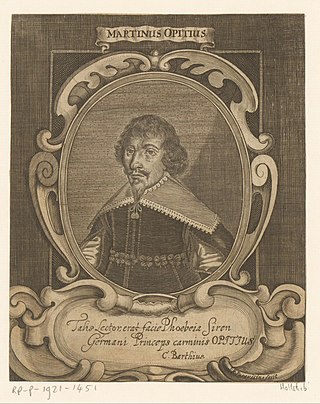
Martin Opitz von Boberfeld was a German poet, regarded as the greatest of that nation during his lifetime.
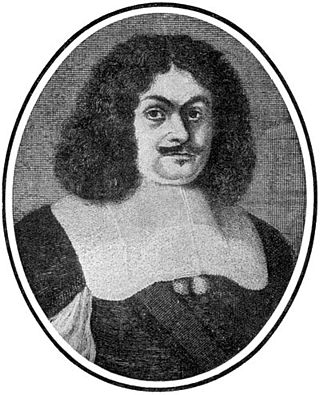
Andreas Gryphius was a German poet and playwright. With his eloquent sonnets, which contains "The Suffering, Frailty of Life and the World", he is considered one of the most important Baroque poets of the Germanosphere. He was one of the first improvers of the German language and German poetry.
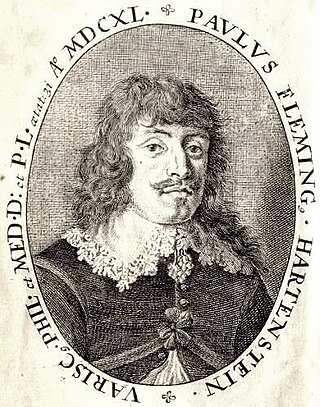
Paul Fleming, also spelt Flemming, was a German physician and poet.

Johann Gottfried Walther was a German music theorist, organist, composer, and lexicographer of the Baroque era.

Georg Rudolf Weckherlin was a German poet and diplomat. Influenced by the French La Pléiade, his poetry introduced Renaissance forms and themes previously unknown in German verse.
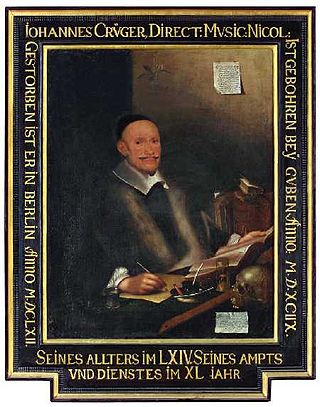
Johann Crüger was a German composer of well-known hymns. He was also the editor of the most widely used Lutheran hymnal of the 17th century, Praxis pietatis melica.

Peter Crüger or Peter Krüger was a mathematician, astronomer, polymath, and teacher of Johannes Hevelius.
Johann Georg Moeresius (1598–1657) was a poet and rector in Danzig (Gdańsk), Poland.
Constantia Zierenberg (1605–1653) was a singer and musician from Danzig (Gdańsk) in the Polish–Lithuanian Commonwealth.

Johann Heermann was a German poet and hymnodist. He is commemorated in the Calendar of Saints of the Lutheran Church on 26 October with Philipp Nicolai and Paul Gerhardt.
Nationality words link to articles with information on the nation's poetry or literature.
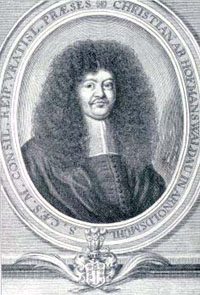
Christian Hoffmann von Hoffmannswaldau was a German poet of the Baroque era.

The Academic Gymnasium Danzig was a school founded in Gdańsk, Poland. It was founded in 1558 by Johann Hoppe (1512–1565), who had previously worked at schools in Chełmno and Elbląg until Catholic Prince-Bishop Stanislaus Hosius closed them. For most of its existence it had a character similar to that of a university.

Bartholomeus Strobel the Younger or Bartholomäus in German or Bartlomiej in Polish was a Baroque painter from Silesia, who worked in Prague, Silesia, and finally Poland, where he emigrated to escape the disruption of the Thirty Years War.

Johann Stobäus was a North German composer and lutenist.
Daniel Friderici was a German cantor, conductor, and composer.
Robert Roberthin was a German Baroque poet. He wrote under his own name, as well as the anagram Berrintho.

Praxis pietatis melica is a Protestant hymnal first published in the 17th century by Johann Crüger. The hymnal, which appeared under this title from 1647 to 1737 in 45 editions, has been described as "the most successful and widely-known Lutheran hymnal of the 17th century". Crüger composed melodies to texts that were published in the hymnal and are still sung today, including "Jesu, meine Freude", "Herzliebster Jesu", and "Nun danket alle Gott". Between 1647 and 1661, Crüger first printed 90 songs by his friend Paul Gerhardt, including "O Haupt voll Blut und Wunden".